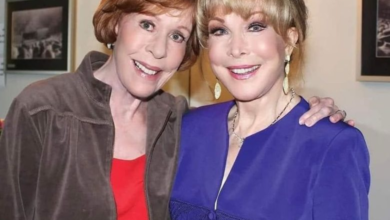My Date Paid for Dinner, Then Everything Took a Turn!

A Cautious Beginning to a Promising Evening
When my close friend Mia suggested setting me up with one of her boyfriend’s friends, I instantly felt a wave of hesitation. Blind dates have never been my thing. But Mia was persistent, insisting that this one would be different.
“You’ll really like him,” she said confidently. “He’s respectful, smart, grounded—a real gentleman.”
Because I trusted her judgment, I decided to push my doubts aside and give it a try.
His name was Eric. We started texting for about a week before meeting in person, and I was pleasantly surprised. His messages were thoughtful and engaging—he actually wrote in full sentences and asked genuine questions instead of sending half-hearted one-liners. His confidence seemed natural, not forced. After several great exchanges, he suggested dinner at a highly rated Italian restaurant downtown.
When the evening finally came, everything started out like a scene from a movie. Eric arrived early, holding a lovely bouquet of roses, dressed neatly in a crisp button-down shirt. “These are for you,” he said with a practiced but seemingly sincere smile. His manners were old-fashioned in the best way—he opened doors, pulled out my chair, and even handed me a small personalized keychain with my initial engraved on it.
I remember thinking, Maybe Mia was right about this one. Our conversation flowed easily—travel, work, awkward dating app stories, and our shared frustration about how expensive movie tickets had become. I felt comfortable and at ease.
When the check arrived, I automatically reached for my purse, but Eric stopped me immediately.
“A man pays for the first date,” he said smoothly, sliding his card to the waiter. It was a little theatrical, but I appreciated the gesture and didn’t argue.
As we left the restaurant, he offered me his arm and walked me to my car. He even waited until I started the engine before leaving. No awkward tension, no pressure—just a genuinely pleasant night. I texted Mia on my way home: You might actually be right about this one.
📧 The “Invoice” That Ended Everything
The next morning, I woke up smiling, expecting a sweet message from Eric saying something like, Had a great time last night.
Instead, what I found made my stomach drop.
An email. Subject line: “Invoice for Last Night.”
At first, I thought it had to be a joke—maybe a meme or a playful reference to the dinner bill. But when I opened it, my heart sank.
It looked shockingly professional—complete with a fake company logo, detailed tables, and a total “amount due” section. Every kind gesture from the night before had been turned into a line item:
- Dinner: $120 — covered in full
- Flowers: “In-kind gesture — repayable with one hug.”
- Keychain: “Gift — repayable with a coffee date.”
- Emotional effort: “Holding hands next time as a sign of gratitude.”
And at the bottom, in bold:
“Failure to comply may result in Chris hearing about it.”
Chris—Mia’s longtime boyfriend and Eric’s friend.
I just stared at the screen, stunned. First disbelief, then disgust. Eric had literally itemized affection and basic decency as if they were services, then used our mutual friend as leverage to pressure me into another date.
I immediately texted Mia: You’re not going to believe this.
I forwarded her the “invoice,” and her reply came within seconds: Oh my god. He’s insane. Don’t respond.
But Mia wasn’t done. Furious and protective, she showed the email to Chris, who was equally horrified. Together, they came up with the perfect way to put Eric in his place.
💥 Getting a Taste of His Own Medicine
That same afternoon, Chris sent Eric his own “invoice.” It looked just as official—complete with a mock logo for “Karma & Co.” and a list of “charges”:
- Emotional disturbance fee: For upsetting a woman.
- Public embarrassment surcharge: For behaving immaturely on a first date.
- Service charge: “For sharing a table with someone clearly out of your league.”
And at the bottom, the finishing touch:
“Failure to comply will result in permanent reputation damage. No refunds.”
Eric lost it. Within minutes, he bombarded me with texts that swung wildly between anger and guilt-tripping.
“You’re overreacting.”
“It was just a joke.”
“You clearly don’t have a sense of humor.”
Finally, he ended with, “You missed out on a great guy.”
I replied with nothing but a thumbs-up emoji—then blocked him.
Later, Mia called me, laughing so hard she could barely breathe. “I swear, I had no idea he was like that!” she said between giggles.
Oddly enough, I wasn’t even angry anymore—just relieved. It’s rare for someone to reveal their true character so early on, but Eric managed it effortlessly.
That ridiculous “invoice” exposed exactly who he was: controlling, entitled, and manipulative, hiding behind a thin layer of fake charm.
When I reread the email later, I realized how planned it all seemed. The formatting, the phrasing, the professionalism—it wasn’t impulsive. He’d probably done it before or at least thought about it. Maybe he expected me to laugh it off, to play along, to let him feel powerful.
Instead, I did the one thing he couldn’t control—I ignored him completely.
In the days that followed, Mia and Chris cut him off completely. When Chris confronted him, Eric doubled down, claiming I was “too sensitive” and that “women can’t take jokes anymore.” Classic deflection.
My phone stayed blissfully quiet after that. No more texts. No more invoices. Just peace.
Looking back, the whole experience feels like something straight out of a dark romantic comedy—starting off with flowers and charm, ending with an email-shaped red flag.
But I did learn something valuable: pay attention to the subtle warning signs before they turn into something impossible to ignore. Anyone who treats kindness or generosity like a debt to be repaid isn’t romantic—they’re manipulative.
So now, when people ask about my worst date ever, I don’t hesitate.
“The guy who sent me an invoice,” I say with a grin.
It always gets a laugh. And I always add:
“And he really thought I’d pay.”
The truth is, I did pay that night—but not the way he expected. I paid attention. And that lesson was worth far more than the dinner bill.



